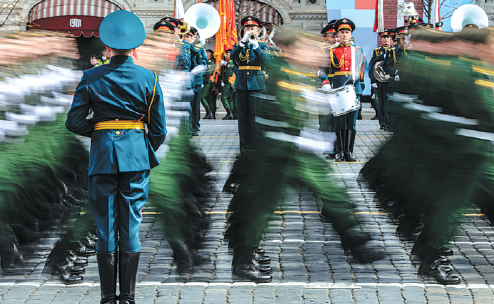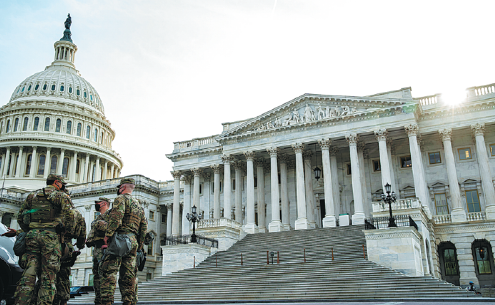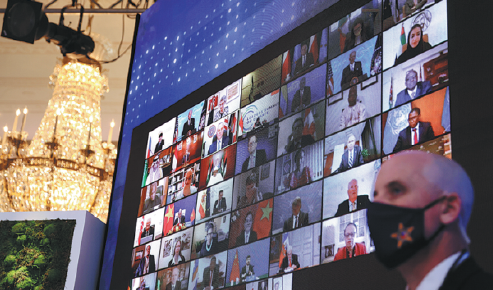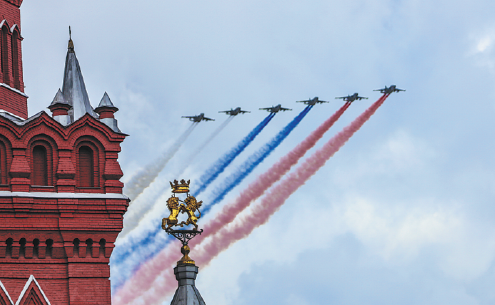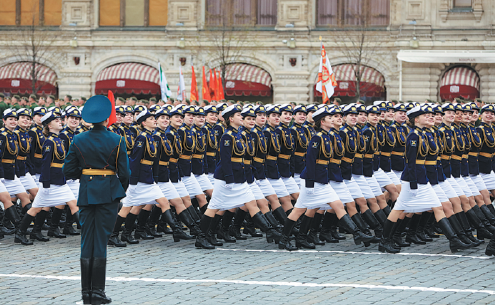HOW RUSSIA AND US WILL COME TO THE TABLE
All eyes on possible summit between Putin and Biden
Global media and think tanks will focus their attention in coming months on a European country, where a summit could be held between Russian President Vladimir Putin and his United States counterpart Joe Biden.
Although it is still not known where the meeting will take place, experts and analysts have begun to predict potential topics to be discussed by the two leaders.
There are a number of things that Biden, unlike his predecessor Donald Trump, would like to achieve on the international stage, ranging from climate change and tax reform to solving the Iran nuclear issue.
However, Sam Greene, a professor of Russian politics at King's College London, said, "Sad as it may sound, there are no problems on Joe Biden's agenda for which Vladimir Putin is a plausible part of the solution."
Regarding climate change, it would be nice to have Russia on board, but the negotiations that really matter are with Brussels, not Moscow, Greene said, adding that when the time comes, Russia will be brought to the negotiating table not by the US, but by Europe, spurred by the European Union's proposed carbon border tax.
The fate of Biden's global minimum tax for transnational corporations does not depend in any meaningful sense on Russia's position, according to Greene.
Washington would dearly like to revive nuclear talks with Iran, but lost faith in the "myth" of Moscow's role as a facilitator with Teheran during the Obama administration, he said.
On strategic arms control, the "low-hanging fruit "in the form of renewing New START, the nuclear arms reduction treaty between the US and Russia, has already been picked. Experts and policymakers hold little hope for an ambitious agenda beyond this, not least because of doubts in the US Senate.
Moscow could cause problems if it wanted to, but the US believes that strategic stability is equally important to both countries. On this front, at least, the Biden administration is content to rely on Putin's rationality, Greene said.
The only major issue that cannot be resolved without Moscow's involvement is the conflict in the Donbass region in Ukraine, he said.
The accumulation of Russian forces along the Ukrainian border has worried Washington, and would appear to be the reason why the troops are being massed, according to Greene.
The Biden administration believes that current relations with Moscow should be distanced and dispassionate, although whether this approach will be more effective is open to question, Greene added.
Vast agendas
Pavel Sharikov, head of the Center for Applied Research at the Institute of US and Canadian Studies at the Russian Academy of Sciences, said cybersecurity could be one of the issues discussed at the possible summit.
He said Putin and Biden have vast agendas, and on each issue the two nations have "polar opposite approaches". However, if there is willingness for the summit to go ahead, this means there is a desire to hold productive talks, he added, while warning that events could unfold in an unpredictable fashion.
Steven Pifer, Senior Fellow and director of the Arms Control Initiative at The Brookings Institution, said Biden is the first US president since the Cold War to begin his term not seeking closer relations with the Soviet Union or Russia. There will be no "reset", he added.
In a published analysis, Pifer wrote that in his first 100 days in office, Biden has sought to distinguish his policy from that of his predecessor. He has indicated instead that he will push back against Russian "misbehavior" while seeking to cooperate in areas that advance US interests.
In phone calls to Putin in January and last month, Biden raised issues where US and Russian interests should coincide, such as arms control and strategic stability.
Pifer said that in addition to using arms control to manage their nuclear competition, the two nations presumably share an interest in blunting the nuclear ambitions of Iran and the Democratic People's Republic of Korea. As US and NATO military forces prepare to leave Afghanistan, neither Washington nor Moscow has anything to gain from chaos or from the Taliban returning to power, he added.
In The first 100 days: Breaking with Trump on Russia, Pifer writes, "The Biden administration believes that, even with US-Russian relations at a post-Cold War nadir, the two countries can do business on certain questions where they have mutual interests."
Perhaps that's what makes it possible for Biden to refer to Putin as a "killer" one day, invite him to a summit a few weeks later, and next day impose sanctions on sovereign debt.
Vladimir Frolov, who analyzes Russian politics, said that in diplomatic parlance such behavior is known as "demarche"-a demonstration of strong dissatisfaction with a political partner's actions and statements, but without any concrete negative consequences-yet.
The key question is whether Biden's unexpectedly harsh statement about Putin was simply another example of his well-known "linguistic intemperance", or a calculated and deliberate escalation of his personal conflict with the Russian leader-a direct challenge that the Kremlin could not ignore, Frolov said.
Shortly after the "killer" remarks, former Russian president and prime minister Dmitry Medvedev warned that relations between Moscow and Washington had plummeted to levels last seen during the Cold War.
"In recent years, relations between Russia and the United States have actually shifted from rivalry to confrontation, essentially returning to the Cold War era," said Medvedev, who now serves as deputy chairman of his country's Security Council.
"Sanctions pressure, threats, confrontation, defense of one's selfish interests-all of this is plunging the world into a state of permanent instability," he added.
As Kremlin spokesman Dmitry Peskov said, US-Russian relations are more fraught than ever, and have now hit the bottom.
Robert Legvold, director of the Euro-Atlantic Security Initiative, said Biden's undiplomatic language may have triggered greater indignation than previous US rhetoric. The sanctions may have stung a little more, coming a day after the two presidents held a constructive conversation, but they fall within a pattern of discord that has characterized the relationship for the past seven years, he said.
"The question is whether the advent of the Biden administration will lead to a further hardening of US policy and a tit-for-tat Russian response or, alternatively, create an opening for the two sides to try tentatively to move relations in a more constructive direction," he said.
Two-track policy
Despite widespread pessimism among observers in Moscow and Washington, the current situation between Russia and the US is unfolding at what could be a potential turning point in the relationship.
Legvold said the Biden administration has articulated a two-track Russia policy-one that combines a determination to rebuff Russian behavior it sees as threatening, with a readiness to explore areas of cooperation important to both countries.
This is not that different from the policies pursued by the Obama and Trump administrations. However, because Biden has acted quickly to toughen policy, most observers assume that the "deterrence" side of policy will prevail, and the "detente" side will either remain largely rhetorical or be undermined by the way his government goes about countering Russian actions it finds objectionable, Levgold said.
There are hints of change that, if dealt with constructively by Moscow, could begin to lead the two countries out of their current dead end, even with Biden's national security adviser Jake Sullivan warning that the US would react in ways "seen and unseen", and not only with sanctions.
Russian experts view the possible summit between Biden and Putin as a sign of hope.
The country's Foreign Minister, Sergey Lavrov, said that despite Moscow's move to draw up a list of unfriendly countries, with the US at the top, Russia is positive about Biden's initiative.
Vladimir Vasilyev, Senior Research Fellow at the Russian Academy of Sciences' Institute for US and Canadian Studies, said: "By making the call, Biden initiated another round of the political chess game that previous US administrations used to play… At the same time, his invitation to meet in a third country is also a signal to Washington's allies, indicating that the current White House administration considers the Russian leader to be worthy of a handshake.
"It is also a sort of an apology for the vulgar statement that Joe Biden made in an interview with ABC News."
Pavel Koshkin, also a Senior Research Fellow at the institute, said the phone call "shows that there is a direct communication line between the two presidents". As for Biden's proposal to hold a summit in a third country, it proves that "Washington has to reckon with Moscow" and intends to maintain dialogue, he said.
Meanwhile, the Kremlin has taken Washington's proposal with a pinch of salt, saying it is too early to discuss the venue and date for the summit, Koshkin added.
Peskov said dialogue between Russia and the US was necessary, but the two sides have disagreements on many issues.
Koshkin said Moscow's cautious reaction to the summit can be attributed to the fragile situation between Russia and the US.
The crisis in Ukraine could worsen, leading to the summit being called off, so the Kremlin simultaneously maintains "a realistic and a pessimistic position", he said.
Koshkin added that by seeking to hold the summit, Washington acknowledges that Biden lost his temper during the interview in which he referred to Putin as a "killer".
"Russia is showing that it was offended and is trying to define a framework and determine who will play what role during these talks," he said.
To resolve the crisis in Russian-US ties, one summit would not be enough, calling for a joint effort by both countries' agencies, Koshkin added.
Political scientist Fedor Lukyanov described the latest developments as "a game of chicken". He said it is very important for Biden to make it clear that he is capable of acting in a tougher and more decisive manner than Barack Obama, whose words often failed to match his deeds.
Andrey Kortunov, director-general of the Russian International Affairs Council, said: "In any case, there will be a double-edged conversation. However, it is certainly better to put the cards on the table right away and clarify as to where the two countries can work together under the Biden administration and where they can't."
Contact the writers at renqi@chinadaily.com.cn
